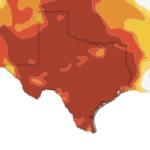New Bill Aims to Quiet Down Texas’ Water Wars

Photo by Chip Somodevilla/Getty Images
A young boy pushes his bicycle out of the Rio Grande after taking a swim with his family where New Mexico, Texas and Mexico all touch. Texas' conflicts with its neighbors over water have heated up during dry times.
As Texas begins a third year of drought, its conflicts over water with neighbors continue. One high-profile case against Oklahoma is on its way to the Supreme Court, Texas has filed a lawsuit against New Mexico, and is accusing Mexico of not sharing the water it should as well.
Hoping to bring a measure of calm to the water wars is State Rep. Lyle Larson, R-San Antonio, who filed a bill Tuesday that would create the Southwestern States Water Commission, a state-level group to work with neighbors like Arkansas, Louisiana, New Mexico and Oklahoma to secure water.
“The concept came up as we traveled around the state, about water that’s contiguous,” Larson says. “There’s an abundance of water that’s available that flows into the Gulf of Mexico, and no one’s capturing the economic benefit from it.”
Larson’s plan would create a six-member state commission that would travel to adjoining state capitals and work to get their water sold to Texas, primarily for use in the Dallas-Fort Worth Metroplex and parts of Central and South Texas.
The Texas-Oklahoma conflict heading to the Supreme Court pits Tarrant County against the state of Oklahoma, which has refused to sell water that the Texas county says it has a right to purchase under existing agreements.
“My idea is, we don’t need to go to the courthouse,” Larson says. “We need to go to the [Oklahoma] capitol, and sit down with the 67 Tribal Councils in Oklahoma and start negotiating.”
The Texas Commission on Environmental Quality (TCEQ) filed a lawsuit with the Supreme Court alleging New Mexico hasn’t shared the water it should according to an compact between the two states dating back to the thirties.
Larson believes that with state-level representation, there’s opportunity for less litigation and more mediation.
“We have not had an open dialogue with folks in Oklahoma City, Santa Fe, Baton Rouge or Little Rock, since the state became sovereign,” Larson says, “You’ve got to start a dialogue. So my focus is, we would have this long-term negotiation to talk about the regulatory, environmental and ultimately compensatory issues.”

Photo courtesy of Lyle Larson
State Rep. Lyle Larson wants to cut down some of the "bravado" in Texas' water conflicts with neighboring states.
The six-member commission would allocate two appointees each to the Governor, Lieutenant Governor, and Speaker of the House. “I’d like to have engineers and folks that have a background in water and developing projects,” Larson says, “but we’d also invite their folks [from other states] to set up their membership on whatever they feel comfortable with.”
Larson maintains that such a dialogue would be welcome in other states, as it stands to bring them economic benefit, while securing new supplies for Texas. “I think it’s going to be a whole lot less expensive than treating water from the coast and bringing it inland, if we’ve got water from these states,” Larson says. A deal with Louisiana to sell a massive amount water to Texas fell apart last January when the Louisiana decided to call it off and wait until the state has an official water plan.
“There’s a lot of opportunity,” he says, “and I think a lot of the bravado when people deal with Texas, and Texans dealing with other states, we need to check that at the door. And we need to start negotiating to figure out how both states can benefit.”



